

Would you like to sponsor this page? Contact gary@baseballinwartime.com
 Joe Gordon
Joe Gordon
Date and Place of Birth: February 18, 1915 Los Angeles, California
Died: April 14, 1978 Sacramento, California
Baseball
Experience:
Major League
Position:
Second Base
Rank:
Corporal
Military Unit:
USAAF
Area Served: Pacific Theater of Operations
Major League Stats: Joe Gordon on Baseball-Almanac
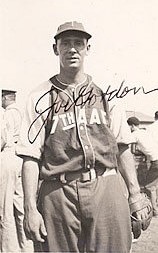 Joseph
L “Joe” Gordon was born on February 18, 1915 in
Joseph
L “Joe” Gordon was born on February 18, 1915 in
Gordon played shortstop for
the Oakland Oaks of the Pacific Coast League his rookie year and
batted .300 in 143 games with 33 doubles, 6 home runs and 56 RBIs.
The following season he was with
Nicknamed “The Flash”, Gordon was an American League all-star for the next five seasons, appeared in five World Series and was the league’s Most Valuable Player of 1942, when he batted .322 with 18 home runs and 103 RBIs. In six seasons, Gordon hit 142 home runs, batted .278 and stole 66 bases. Teamed with Frank Crosetti and then Phil Rizzuto, he made up an exceptional double play combination with his defensive wizardry.
The Yankee star entered
military service at
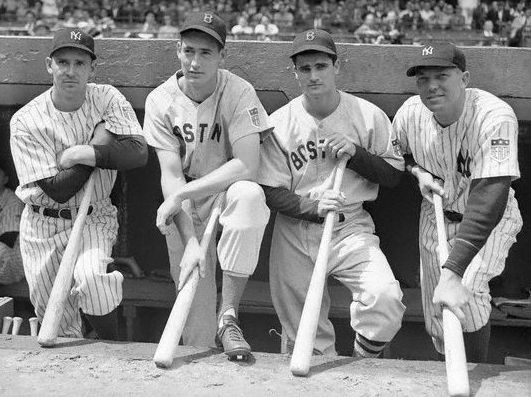 |
| Joe Gordon (left) with Ted Williams, Bobby Doerr and Bill Dickey |
Joy at
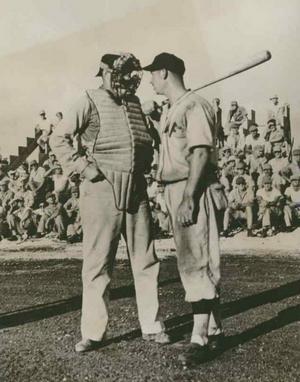 "After
watching the Flash work out here at the Stadium,” wrote the Honolulu
Star-Bulletin on September 2, 1944. “It just isn't possible to
believe that anybody can come close to carrying Gordon's shoes. Joe
has showed that he can play either second or short with anybody in
the game today. Joe has pulled plays here that people would swear
are impossible unless they had seen them with their own eyes."
"After
watching the Flash work out here at the Stadium,” wrote the Honolulu
Star-Bulletin on September 2, 1944. “It just isn't possible to
believe that anybody can come close to carrying Gordon's shoes. Joe
has showed that he can play either second or short with anybody in
the game today. Joe has pulled plays here that people would swear
are impossible unless they had seen them with their own eyes."
The Seventh Air Force was a
powerhouse team. "We had Don Lang, Bob Dillinger, Walter Judnich,
Dario Lodigiani, Mike McCormick and Red Ruffing on our club," Gordon
told The Sporting News in March 1945. "At one point we had a streak
of about 31 straight wins. I think we finished with about an .800
average. Then we played the servicemen's World's Series against the
Navy. It was supposed to be a seven game series but the Navy took us
in four straight games. However, they were mostly close, good games.
Though our team won the pennant during the league season, the Navy
was able to put a much stronger team on the field for the series.
They brought in players from all parts of the Pacific. We could have
had the pick of the other Army teams in
"The Navy had Virgil Trucks,
Johnny Vander Meer, Schoolboy Rowe, Rizzuto, Reese, Mize, Casey,
Ferrick, Grace and McCocky. And they were managed by Bill Dickey.
The series was for servicemen only. I guess there were between
15,000 and 20,000 at each of the four games - all they could squeeze
in. And during the whole season I think the attendance of servicemen
at games in
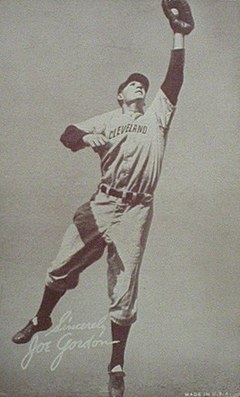 Gordon,
however, neglected to mention his spectacular fielding play in
Servicemen’s World Series. In the first game, playing shortstop,
Gordon grabbed Joe Grace's liner, doubled Virgil Trucks off second
base and tripled his former teammate, Phil Rizzuto, off first.
Gordon,
however, neglected to mention his spectacular fielding play in
Servicemen’s World Series. In the first game, playing shortstop,
Gordon grabbed Joe Grace's liner, doubled Virgil Trucks off second
base and tripled his former teammate, Phil Rizzuto, off first.
In November 1944, Gordon was
back in the
When the spring came around Gordon set up an Air Transport Command baseball team. Joe Marty as the only other major leaguer on the team with the rest of the line-up featuring Bert Bonomi, a Sacramento sandlotter, Fred Meyers, a Cincinnati semi-pro and Julian Sowell, and Atlanta Crackers right-hander. The team had surprising victories against the Oakland Oaks, 7-2, and the San Francisco Seals, 7-5.
Gordon, by this time a
private first class, was a firm believer that interest in baseball
would soar after the war: "Baseball is being played in Army camps
throughout the
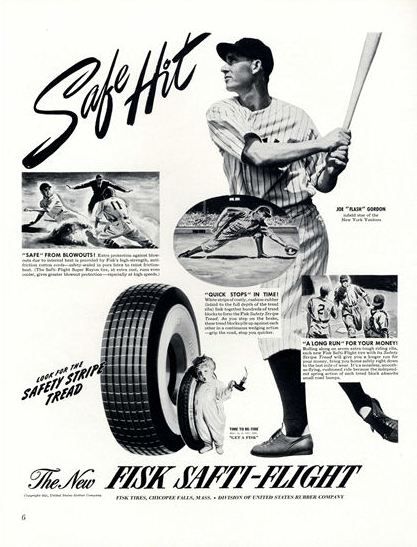
Gordon was back in
In August 1945, Gordon somehow found time to
be used as a ringer in a softball game between the Navy’s press
censors and a team of war correspondents at
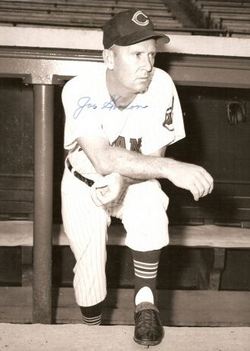 Gordon
was discharged from service on November 14, 1945 at
Gordon
was discharged from service on November 14, 1945 at
“He ordered Bill Dickey (the Yankees’ manager)
to bench me and not play me again. Dickey refused and we just kept
battling.”
At the end of the season, MacPhail sent Gordon and infielder Eddie Bockman to the Indians for Allie Reynolds. He enjoyed four seasons with Cleveland – three as an all-star.
After hitting 253 home runs and batting .268
in 1,566 major league games, Gordon was a player-manager with
Joe Gordon passed away from a heart ailment on
April 14, 1978 in
Created February 26, 2008. Updated November 2, 2009.
Copyright © 2015 Gary Bedingfield (Baseball in Wartime). All Rights Reserved.